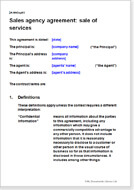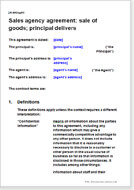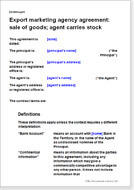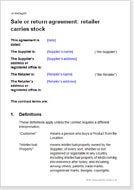Sales agency agreements
The role of sales agents varies greatly. At their most basic, sales agency agreements cover commission payments on sales generated by the agent. More complex arrangements may include the agent marketing the product or service, warehousing and distribution, and payment collection.
Sales agency agreement: sale of services
This is a comprehensive sales agency agreement for the sale of any service anywhere in the world.
The agent represents the principal, but is restricted so that he cannot bind the principal to terms that the principal would not accept.
Our extensive notes guide you to compliance with the Commercial Agents (Council Directive) Regulations 1993.
The agreement sets out the responsibilities of each party and defines the limitations of the power of the agent.
We provide you with options to control many aspects of the arrangement: you can state how the services should be sold, how clients are to be managed, what information you require, ownership and use of intellectual property and many other details.
Sales agency agreement: sale of goods; principal delivers
This is a standard agreement for a business selling goods of any type, that uses self-employed agents as a sales team but delivers goods direct to the customer, and not through the agent.
It covers the usual agency situation where the agent has responsibility for selling the goods, conducting marketing under your directions and maintaining customer goodwill.
This document has been drawn so as to help protect your business and provide an administrative framework for your arrangements with agents.
Use this agreement for a deal with a single agent or a corporate organisation; for selling to small or large customers.
Export marketing agency agreement: sale of goods; agent carries stock
This is a full contract for use by a business selling goods outside the UK using an export marketing agent.
Your agent is probably a company. It certainly has its own warehouse and appropriate logistics and control systems.
The agent holds stock of your product and handles all matters of importation and local regulation. You can define their precise duties depending on what you have agreed. There are options for all aspects of importation: delivery, transport, insurance, regulation, duties and taxes.
The sales agency agreement template also includes the options for the agent to collect your money and to bank it locally, or for you collect as you would do in the UK. Each option leads to different outcomes in other parts of the document.
We deal with all points clearly and in plain English, which your agents are likely to understand.
Sale or return agreement: retailer carries stock
This is the essential sale or return agreement for a deal between a trader or manufacturer on the one hand and any retailer. The essential feature is that the manager of the shop or other venue takes responsibility for the goods while in his care and pays the goods owner only for those he has sold.
The document is suitable for a wide range of different deals, from an arrangement to place vending machines on railway stations to a deal to leave costume jewellery in a single gift shop (similar to an unmanned concession).
The retailer may trade from a shop, or from events or shows, temporary or permanent. The point of sale could also be located at an office (a vending machine) or public space.
The retailer holds your stock and accounts to you as you require, for sales in the previous period.
Some features unique to this agreement are:
- many stock holder obligations for you to choose from
- retention of your title while your goods are with the marketer
- indemnity in case things go wrong
- alternative termination arrangements
This document is not suitable as a concession agreement where the concession is staffed by the seller and/or a fixed space is managed by the seller.

If the document isn’t right for your circumstances for any reason, just tell us and we’ll refund you in full immediately.

We avoid legal terminology unless necessary. Plain English makes our documents easy to understand, easy to edit and more likely to be accepted.

You don’t need legal knowledge to use our documents. We explain what to edit and how in the guidance notes included at the end of the document.

Email us with questions about editing your document. Use our Lawyer Assist service if you’d like our legal team to check your document will do as you intend.

Our documents comply with the latest relevant law. Our lawyers regularly review how new law affects each document in our library.
What is a sales agency agreement?
A sales agency agreement sets out the all the terms under which a principal (a supplier, manufacturer or distributor) appoints a sales agent to negotiate and enter into a contract on their behalf.
The agent promotes the principal's products or services in return for payment.
It covers the duties and obligations of the principal and the agent, how the agent will be remunerated (usually on a commission basis if sales targets are achieved) and the process for termination of the agreement.
Why is it important to use a written agreement?
An agent is someone who has agency - the ability to act on behalf of the principal as if they were them. Although the agent signs the deal, the contract is between the principal and the customer.
As such, it is important for the principal to set out the boundaries of what the agent may do in their name, and it is important for the agent to have a record of how they will be paid.
If the role of the agent and the limitations of what they may do are not clear, then the agent may spend time and effort acting in a way that the principal does not want.
As with all legal documents, recording the arrangement in a written agreement means that both parties are clear as to the obligations of each.
Sales agency is similar to a dsitribution arrangement, except that the distributor is the party to the contract with the end customer.
Limiting the powers of an agent
The purpose of appointing a sales agent is to have somone else carry out promotion where the company otherwise cannot.
It may be that the agent is able to access new geographical areas. It may be that the agent already has connections with potential clients.
But the principal will want to make sure that the agent can only enter into certain types of contracts, for example, those in a particular country, those with completely new clients, those for the supply of a particular product or service. Additionally, the principal will want to control the terms on which the agent brings in new customers - for example, by specifying a minimum price, a minumum sales order quantity (or maximum) and financing, payment and delivery terms.
Exclusivity and non exclusivity
An agent may be appointed on an exclusive basis or a non exclusive basis.
The former means that the sales agent has exclusive rights to operate on the company's behalf, giving them the benefit of no other competition. The benefit to the principal is that the agent may accept terms that are slightly less favourable as the price for exclusivity.
The latter means that there could be other agents operating in the same territory, or selling to the same types of clients. Because agents are generally paid commission, if making a sale is tougher because of increased competition, the agent may demand higher commission rates and more flexibility to make deals.
Thank you
Paul Huxford PHVC Ltd
All rights reserved




